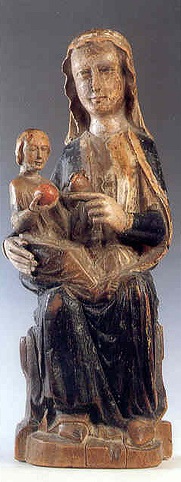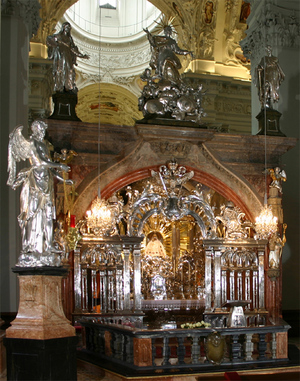Gratia agentes Deo Patri

Thursday of the Twenty-Second Week of the Year I
Colossians 1:9-14
Psalm 97:2-3ab, 3cd-4, 5-6 (R. 2a)
Luke 5:1-11
Toward Mariazell
On this eve of our Holy Father’s pilgrimage to the Benedictine sanctuary of Mariazell in Austria, we prepare our hearts to go in pilgrimage with him. Pope Benedict XVI’s pilgrimage will mark the 850th anniversary of the founding of Mariazell, the Basilica of the Birth of the Blessed Virgin Mary. Another highlight of the Holy Father’s journey will be a visit to the flourishing Cistercian Abbey of Heiligenkreuz, a vibrant community that has more new vocations at present than it has had in the past two hundred years.
Pilgrimages of the Heart
Last week’s papal pilgrimage to the Holy House of Loreto and tomorrow’s pilgrimage to Our Lady of Mariazell underscore for all Catholics the importance of going in humility and confidence to places made holy by the prayers of the faithful through the ages, and by a mysterious presence of the Mother of the Lord in her images. Not all of us are able to make grand pilgrimages, but each of us can make small ones, inner pilgrimages of the heart, outwardly signified by some gesture of faith.
Visits to the Blessed Virgin Mary
Saint Alphonsus wisely recommends a daily visit to the Blessed Virgin Mary. Listen to him: “And now as to the visits to the Most Blessed Virgin, the opinion of Saint Bernard is well known and generally believed: it is that God dispenses no graces otherwise than through the hands of Mary…. Do you then, be also careful always to join to your daily visit to the Most Blessed Sacrament a visit to the Most Holy Virgin Mary in some church, or at least before a devout image of her in your own house. If you do this with tender affection and confidence, you may hope to receive great things from this most gracious Lady, who, as Saint Andrew of Crete says, always bestows great gifts on those who offer her even the least act of homage.”

Knowledge, Wisdom, and Understanding
Yes, the gifts of God are dispensed through the hands of Mary. This is true of the seven gifts of the Holy Spirit because, as the saints teach us, where Mary is present the Holy Spirit rushes in. In today’s First Reading Saint Paul asks that the Colossians be filled with three of these gifts. “We have not ceased to pray for you, asking that you may be filled with the knowledge of His will in all spiritual wisdom and understanding” (Col 1:9). Knowledge, wisdom, and understanding: three of the Holy Spirit’s seven gifts.
Obedience and Thanksgiving
Saint Paul prays that the Colossians may be gifted with knowledge of the Father’s will, but the mere knowledge of the Father’s will is not enough or, rather, it is unbearable and utterly beyond us, without the gifts of wisdom and understanding. We are not saved by knowledge. Our Lord makes this clear in the parable of the two sons (Mt 21:28-31). Going to the first son, and then to the second, the father said, “Son, go and work in my vineyard today” (Mt 21:28). The first son refused, and then turned around and obeyed. The second son said, “I go, sir” (Mt 21:30), but did not go. Mere knowledge of the Father’s will does not make us holy. We are saved and sanctified — that is to say, healed and divinized — by grace and by the gifts of the Holy Spirit that make possible for us to say both the “Amen” of obedience and the “Alleluia” of thanksgiving.
In Darkness
Sometimes it pleases God to withhold the knowledge of His will, or so it seems to us. At certain moments, the will of the Father may be to leave us seemingly clueless. At no time are the gifts of the Holy Spirit more necessary than when we find ourselves saying with the psalmist, “Friend and neighbor Thou hast put far from me: my one companion is darkness” (Ps 87:19).

Wisdom: The Taste of Love
The gift of wisdom allows me to believe in love when everything around me says, “There is no love for you here.” The gift of wisdom is the faintest taste of love to the palate of the soul, even in those dark hours when, with Job, I would want to cry out, “Though He slay me, yet will I trust Him” (Jb 13:15). I am reminded of the words of Father Ernest Lelièvre (1826-1889): “I know and am perfectly certain that, of all the calculations I could make, the wisest is to abandon myself to Him.” It is the gift of wisdom makes that kind of resolution possible.
Understanding the Father’s Provident Love
The gift of understanding allows me to see the hand of the Father in all of life’s twists and turns. It does not mean that I will understand what is happening to me or to my loved ones; it means understanding that whatever happens, I am held fast in the embrace of a Provident Love that will not let me go. It is this gift that keeps us from fretting like pagans. Our Lord’s command is clear: “Be not solicitous therefore, saying, ‘What shall we eat, or what shall we drink, or wherewith shall we be clothed?’ For after all these things do the heathens seek. For your Father knoweth that you have need of all these things. Seek ye therefore first the kingdom of God, and His justice, and all these things shall be added unto you” (Mt 6:31-33).
The gift of understanding is not about understanding what happens to us or around us; it is about understanding with Saint Paul that, “to them that love God, all things work together under good” (Rm 8:28). The gift of understanding allows me to obey the explicit mandate of the Lord: “Be not therefore solicitous for tomorrow; for the morrow will be solicitous for itself. Sufficient for the day is the evil thereof” (Mt 6:34).
The Fruits of the Holy Spirit
Again, the gift of understanding allows me to say, with Jesus, to the Father, “Now is my soul troubled. And what shall I say? ‘Father, save me from this hour?’ But for this cause I came unto this hour” (Jn 12:27-28). The peace that flows from repeating these words of Our Lord comes not from my own human understanding of what is happening, but from the Holy Spirit’s gift. Knowledge of the Father’s Will, accompanied by the gifts of spiritual wisdom and understanding, never causes anxiety, or panic, or rebelliousness, or fear. On the contrary, the gifts of the Holy Spirit are illustrated in the twelve fruits of the Holy Spirit. In particular, Saint Paul mentions “patience, and longsuffering with joy” (Col 1:11).
Thanksgiving
All of this makes sense in the context of Saint Paul’s prayer of thanksgiving, his own Eucharistic prayer. In praying for the Colossians, the apostle is really teaching them how to pray, and in teaching them how to pray, Saint Paul is teaching us how to pray. “Therefore,” says the Apostle, “we also, from the day that we heard it, cease not to pray for you … giving thanks to God the Father, who hath made us worthy to be partakers of the saints in light” (Col 1:9, 12). And that is why we offer the Holy Sacrifice of the Mass: to pray for all the Church, and to give thanks.

Very beautiful indeed.